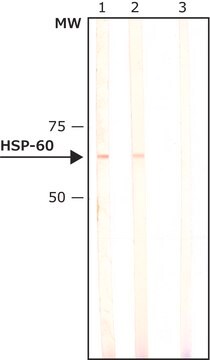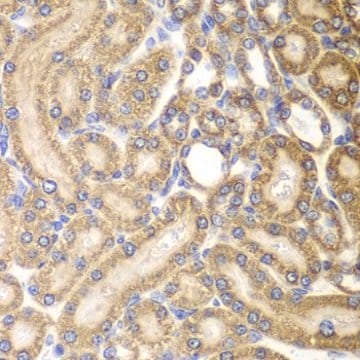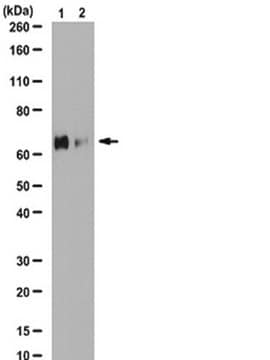H4149
Monoclonal Anti-Heat Shock Protein 60 antibody produced in mouse
clone LK1, ascites fluid
About This Item
Recommended Products
biological source
mouse
Quality Level
conjugate
unconjugated
antibody form
ascites fluid
antibody product type
primary antibodies
clone
LK1, monoclonal
mol wt
antigen 60 kDa
contains
15 mM sodium azide
species reactivity
rat, human, chicken
technique(s)
electron microscopy: suitable
immunohistochemistry (formalin-fixed, paraffin-embedded sections): suitable
indirect ELISA: suitable
western blot: 1:400 using cultured human foreskin fibroblast extract
isotype
IgG1
UniProt accession no.
shipped in
dry ice
storage temp.
−20°C
target post-translational modification
unmodified
Gene Information
human ... HSPD1(3329)
rat ... Hspd1(63868)
General description
Specificity
Immunogen
Application
- Enzyme linked immunosorbent assay (ELISA)
- Immunoblotting
- Immunocytochemistry
- Immunohistochemistry
- Immunoelectron microscopy
- Double immunofluorescence
Biochem/physiol Actions
Physical form
Disclaimer
Not finding the right product?
Try our Product Selector Tool.
recommended
Storage Class Code
10 - Combustible liquids
WGK
nwg
Flash Point(F)
Not applicable
Flash Point(C)
Not applicable
Certificates of Analysis (COA)
Search for Certificates of Analysis (COA) by entering the products Lot/Batch Number. Lot and Batch Numbers can be found on a product’s label following the words ‘Lot’ or ‘Batch’.
Already Own This Product?
Find documentation for the products that you have recently purchased in the Document Library.
Our team of scientists has experience in all areas of research including Life Science, Material Science, Chemical Synthesis, Chromatography, Analytical and many others.
Contact Technical Service








